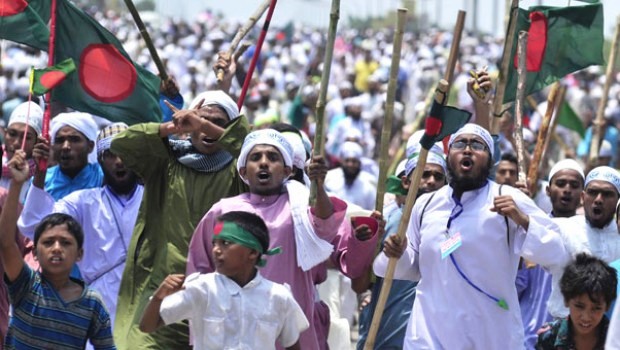To an Indian who grew
up in the 1970s and ‘80s, the sights of Dhaka, Bangladesh, seem to belong to a
past that Indian metropolises have mostly outgrown: exuberantly battered buses,
unpainted buildings, pavement book vendors with faded posters of Rabindranath Tagore and
Karl Marx as well as the Rolling Stones, and pitch darkness on the unlit
streets and squares where rural migrants congregate in the evenings. The
countryside still feels closer here than in Kolkata or Mumbai.
In recent years, Bangladeshis
have suffered the brutality of security forces and massive environmental
destruction. For months now, the news from the world’s seventh-most-populous
country has been dominated by the fractiousness of the country’s main leaders,
the trial of men
suspected of war crimes during Bangladesh
I arrived in Dhaka during one of the many recent strikes called by the
opposition party, the Bangladesh Nationalist Party, against the ruling Awami
League. The shutdowns, imposed through force, seemed economically ruinous,
damaging small businesses the most; they resolved nothing. At first glance, Bangladesh
Irreconcilable
Differences
Shackled by
irreconcilable differences between political personalities, the country offers
yet another instance of a fledgling democracy undermined by an undemocratic
winner-takes-all attitude among its leaders. Bangladesh India Bangladesh
But the benefits of
trade liberalization -- and, in general, Bangladesh
What happens next? Can Bangladesh Bangladesh
The author, a
Bangladesh-born social anthropologist named Delwar Hussain, describes the
strange aftermath of the Khonighat Limestone Mining Project. Situated near the
Bangladeshi district of Sylhet and the Indian state of Meghalaya, Khonighat was
one of the spectacular projects of national modernization that every
postcolonial country once boasted of. India
The grids were no
accident. They spoke of the rationalization and bureaucratization -- two
crucial aspects of modernity -- that were supposed to weaken the hold of
religion and custom. The worship of older authorities was to be discarded in a
projected future full of plentiful modern goods and pleasures. In the
postcolonial imagination of progress, projects such as big dams, factories and
roads were expected to bring the backward masses out of the rural hinterlands
and propel them into first-world prosperity.
Main Patron
Many of the new citizens of Pakistan, and then Bangladesh
after 1971, eagerly participated in these public works, largely because
employees were offered, as Hussain writes, “progress, status and prestige”
through a range of welfare provisions: skills training, set wages, fixed
working hours, health and safety regulations, pensions. The state, in turn,
enjoyed its greatest legitimacy as the main patron of economic development.
But state-led projects
such as Khonighat mostly helped people who were within its ambit; the majority
of the country’s population remained trapped in poverty. Khonighat was closed
down in 1993 after it became cheaper to import limestone from an economically
liberalized India , and the
World Bank and International Monetary Fund put greater pressure on Bangladesh
With its rusting
machinery, unused cranes and half-torn railway tracks, Khonighat is now a ruin
-- of the kind that, in Walter Benjamin’s vision, piles up as the storm of
progress blows through the world. Meanwhile, the adjacent village of Borapani
Feeding the demands of Bangladesh
Subsidiary Professions
Religious practices suppressed by the secular ethos of
Khonighat have also emerged. The coal business has generated some semi-illegal
subsidiary professions, such as the trade in SIM cards in an area where both
Indian and Bangladeshi governments have banned the use of mobile phones. Many
of the older beneficiaries of the welfare and developmental state are now in
retreat; they wallow in nostalgia for the good times of state-backed
modernization and lament the new culture of greed and selfishness, while entrepreneurs
who walk a fine line between criminality and legality flourish.
What does the creation
of a new unsupervised social order with its multiple actors portend for Bangladesh
There are other, less
tangible losses in this brave new world: Garment workers in Dhaka
pleading for better work conditions after an April factory collapse killed more than 1,000 people are
asking for things that the employees of Khonighat effortlessly possessed.
Hussain’s mood is not all bleak. He points to “creative
potentialities and possibilities” in the assertion of formerly excluded
communities. Noting their record of religious tolerance, he hails the
“disorganized cosmopolitanism” of Borapani. But he seems aware, too, of
simmering frustrations among the “floating mass” of workers in unregulated
zones. Much of today’s social and religious violence in India
Above all, millions of
South Asians suffer from a general loss of national direction in an age when
every man seems to be out for himself. In Bangladesh, as in India and Pakistan,
the collapse of old nation-building projects of modernization has deprived most
citizens of the stories and images through which they imagined themselves to be
part of a larger whole.
For them, the
disenchantment of the world feared by Max Weber has happened even while they
await, seemingly forever, the next step into consoling prosperity and leisure.
Meanwhile, ethnic and religious sectarians stand ready to channel their rage
over being cheated. In that sense, Bangladesh ,
with its already antique modernity, illuminates South Asia ’s
troubled present as vividly as it does its past.
First
published in Bloomberg.com, December 2, 2013
Pankaj Mishra is the author of “From the Ruins of Empire: The Revolt Against
the West and the Remaking of Asia” and a Bloomberg View columnist. For
comments: pmashobra@gmail.com



